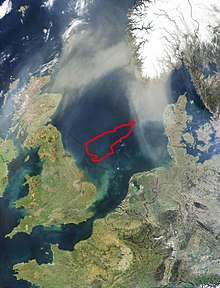Dogger Bank

Dogger Bank (from dogge, an old Dutch word for fishing boat) is a large sandbank in a shallow area of the North Sea about 100 km off the coast of the United Kingdom. It extends over approximately 17,600 km² (~6800 square miles), with its maximum dimensions being about 260 km / 160 miles from north to south and 95 km (~60 miles) from east to west. The water depth ranges from 15-36 metres, about 20 m shallower than the surrounding sea. Geologically, it is a moraine, formed at the southern extent of glaciation during the last ice age. At times during the last ice age it was land, either an island or joined to the mainland. Trawlers working the area have dredged up large amounts of moor peat.
The bank is the remains of a large landmass known as Doggerland, which existed during the last ice age and connected Britain to the European mainland.
The bank has been the site of several naval actions. During the War of American Independence, a Royal Navy squadron fought a Dutch squadron on August 5 1781 in the Battle of Dogger Bank (1781). During the Russo-Japanese War, Russian naval ships opened fire on British fishing boats in the Dogger Bank incident on October 21 1904, mistaking them for Japanese torpedo boats. In the First World War, the area saw the Battle of Dogger Bank (1915), a naval engagement between the Royal Navy and the Kaiserliche Marine which were intending to shell the Yorkshire coastal towns of Scarborough, and Whitby and the town of Hartlepool in County Durham .
In 1931, the largest earthquake ever recorded in the United Kingdom took place below the bank, measuring 6.1 on the Richter scale. Its focus was 23 km beneath the bank, and the quake was felt in countries all around the North Sea, causing damage across eastern England.
The bank is an important fishing area, with cod and herring being caught in large numbers. It gives its name to the Dogger region used in the BBC Radio 4 Shipping Forecast. Several shipwrecks lie on the bank.
